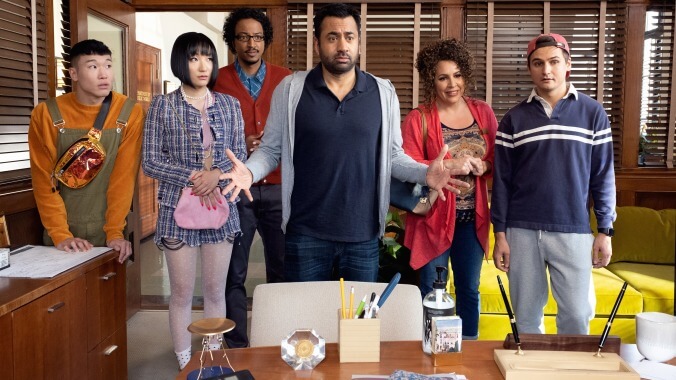The creators of Sunnyside on making patriotic comedy in less than patriotic times


Sunnyside comes to NBC with a timely premise: Premiering at a time when knob-headed White House ghoul Stephen Miller is attempting to roll back the number of refugees admitted to the United States, just weeks after Trump immigration czar Ken Cuccinelli did some unsolicited punch-up on “The New Colossus,” here’s a sitcom about a tired, poor, huddled mass yearning to breathe free. But the bones of Sunnyside are timeless: It’s the latest, Michael Schur-produced rendition of a treasured sitcom standard, in which a down-on-his-luck protagonist reluctantly falls in with a ragtag ensemble that just might wind up teaching him as much he teaches them. In this case, that protagonist is Kal Penn as Garrett Modi, a former political hot shot who burned out during his time on the New York City Council; at his lowest ebb, he winds up being adopted as the tutor of a group studying for their U.S. citizenship test, whose ranks include Joel Kim Booster, Moses Storm, Diana-Maria Riva, Samba Schutte, and Poppy Liu. Along with fellow Sunnyside creator Matt Murray, Penn sat down with The A.V. Club at this summer’s Television Critics Association press tour, to discuss their show, their country, and their search for “the funniest people possible to play the people we had written, period.”
AVC: What does the idea of America represent to the characters of Sunnyside?
Kal Penn: I think hope and freedom and limitless possibility—the universal definition that we all think of. That’s not new, that goes back to the founding of America. But five years ago, when I was thinking of this concept—it seems almost flippant to say, “Oh, I love comedy and I love America”—but wanting to make a patriotic comedy was important because it’s that feel-good thing that you feel when you would watch Head Of The Class or Fresh Prince. [Those shows weren’t] about being American—but that idea that all things are possible, that aspirational theme is what we’re bringing to the show.
Matt Murray: We obviously identify with Kal’s character on the show, as someone who never really sat and thought about how lucky you are just to be born here. So when you actually see the amount of work and torture that people have to go through just to get through this process that’s incredibly byzantine and almost intentionally difficult, it’s like, “Oh, they must really love it if they have to go through all that just to get this thing that I was given.”
AVC: How do you think the last five years have shifted that idea? What is it like making a comedy about patriotism at a time when a lot of people aren’t feeling particularly patriotic, and maybe even feel like some of the ideals that are being expressed by the show are being exploited by people in power?
KP: I thought about that before [Matt and I] had the chance to sit down. I thought, “Do I want to change my pitch at all?” Because my pitch to myself was “I love making people laugh, I love America—love what it means, love that it’s a unifying, hopeful place.” And I thought, “No. The premise of the show is never meant to be a reaction to anything,” whether it was a reaction to the five years preceding the five years that I had been sitting with the idea or the five years that came after. To me, a strong show comes from strong characters, and the idea of America, or the idea of something hopeful doesn’t change with our short-term politics.
MM: It’s impossible to ignore what’s happening, but at the same time people who are going through this process, that goal looks the same. The politics will change here and there, but the goal’s always the same. That’s how we center ourselves.








































